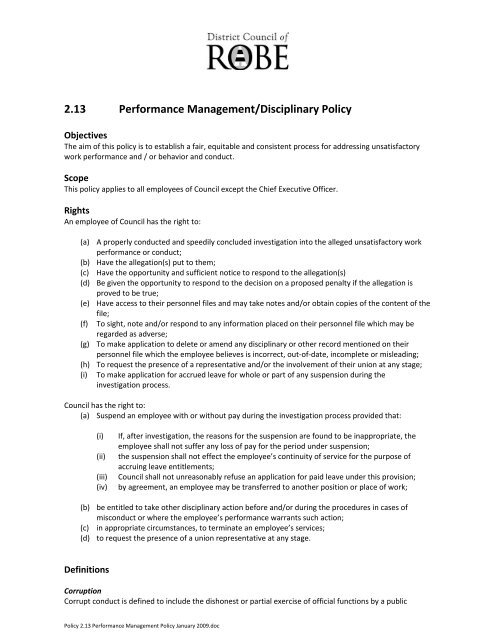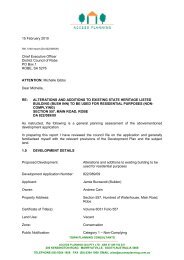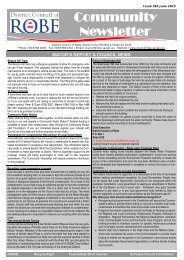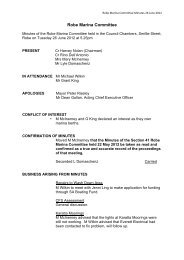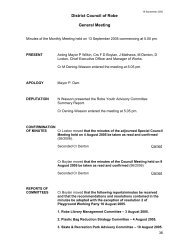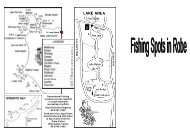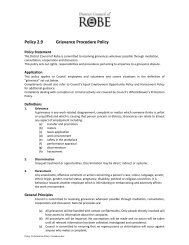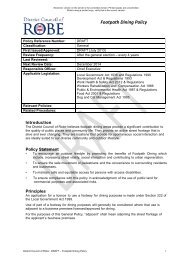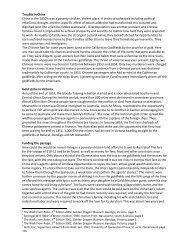2.13 Performance Management/Disciplinary Policy - Robe
2.13 Performance Management/Disciplinary Policy - Robe
2.13 Performance Management/Disciplinary Policy - Robe
You also want an ePaper? Increase the reach of your titles
YUMPU automatically turns print PDFs into web optimized ePapers that Google loves.
<strong>2.13</strong> <strong>Performance</strong> <strong>Management</strong>/<strong>Disciplinary</strong> <strong>Policy</strong><br />
Objectives<br />
The aim of this policy is to establish a fair, equitable and consistent process for addressing unsatisfactory<br />
work performance and / or behavior and conduct.<br />
Scope<br />
This policy applies to all employees of Council except the Chief Executive Officer.<br />
Rights<br />
An employee of Council has the right to:<br />
(a) A properly conducted and speedily concluded investigation into the alleged unsatisfactory work<br />
performance or conduct;<br />
(b) Have the allegation(s) put to them;<br />
(c) Have the opportunity and sufficient notice to respond to the allegation(s)<br />
(d) Be given the opportunity to respond to the decision on a proposed penalty if the allegation is<br />
proved to be true;<br />
(e) Have access to their personnel files and may take notes and/or obtain copies of the content of the<br />
file;<br />
(f) To sight, note and/or respond to any information placed on their personnel file which may be<br />
regarded as adverse;<br />
(g) To make application to delete or amend any disciplinary or other record mentioned on their<br />
personnel file which the employee believes is incorrect, out‐of‐date, incomplete or misleading;<br />
(h) To request the presence of a representative and/or the involvement of their union at any stage;<br />
(i) To make application for accrued leave for whole or part of any suspension during the<br />
investigation process.<br />
Council has the right to:<br />
(a) Suspend an employee with or without pay during the investigation process provided that:<br />
(i)<br />
(ii)<br />
(iii)<br />
(iv)<br />
If, after investigation, the reasons for the suspension are found to be inappropriate, the<br />
employee shall not suffer any loss of pay for the period under suspension;<br />
the suspension shall not effect the employee’s continuity of service for the purpose of<br />
accruing leave entitlements;<br />
Council shall not unreasonably refuse an application for paid leave under this provision;<br />
by agreement, an employee may be transferred to another position or place of work;<br />
(b) be entitled to take other disciplinary action before and/or during the procedures in cases of<br />
misconduct or where the employee’s performance warrants such action;<br />
(c) in appropriate circumstances, to terminate an employee’s services;<br />
(d) to request the presence of a union representative at any stage.<br />
Definitions<br />
Corruption<br />
Corrupt conduct is defined to include the dishonest or partial exercise of official functions by a public<br />
<strong>Policy</strong> <strong>2.13</strong> <strong>Performance</strong> <strong>Management</strong> <strong>Policy</strong> January 2009.doc
official. Conduct of a person who is not a public official, when it adversely affects the impartial or honest<br />
exercise of official functions by a public official, also comes within the definition.<br />
The most common form of corruption in the public sector is bribery. Other forms of corruption include<br />
sabotage of plant, equipment and other assets, providing confidential information to external parties, and<br />
generally anything that reduces the effectiveness or impairs the operations or reputation of Council.<br />
Fraud<br />
Fraud is a crime involving the dishonest obtaining of a financial benefit by deception. Some examples of<br />
fraud include:<br />
(a) Unauthorised use of Council plant and equipment;<br />
(b) Theft of money or goods from Council or its customers including computer programs and<br />
stationary;<br />
(c) Claiming unworked overtime or time in lieu on timesheets;<br />
(d) Providing confidential Council information to unauthorised people or organisations;<br />
(e) Allowing access to Council buildings and resources to unauthorised persons;<br />
(f) Obtaining benefits by use of a false identity or false qualifications;<br />
(g) Allowing contractors to not fully meet contract requirements.<br />
Harassment<br />
This is any unwelcome and/or offensive comment or action concerning a person’s race, colour, language,<br />
accent, ethnic origin, gender, marital status, pregnancy, disability, political or religious conviction. It is<br />
behavior towards another employee or individual which is intimidating or embarrassing and adversely<br />
affects the work environment.<br />
Behaviour which may constitute harassment includes, but is not limited to, staring, leering, touching or<br />
unwanted familiarity, taunts, insults, jokes, gestures and deliberate exclusion.<br />
Unsatisfactory Work <strong>Performance</strong> or Conduct<br />
Unsatisfactory work performance or conduct includes, but is not limited to, neglect of duties, breach of<br />
discipline, serious breach of policy and/or procedure, harassment, absenteeism, or deliberate noncompliance<br />
with safety standards.<br />
Responsibilities<br />
Line Managers/Supervisors<br />
Maintaining day‐to‐day discipline is the responsibility of line management. An employee’s immediate<br />
supervisor is responsible for initiating disciplinary actions when the employee’s workplace performance is<br />
unsatisfactory due to, but not limited to, neglect, inefficiency, unacceptable behavior, non‐compliance with<br />
safety standards and requirements, poor attendance, lack of punctuality and repeated insubordination and<br />
so on.<br />
Senior Manager/Chief Executive Officer<br />
For situations, such as serious misconduct, bringing the Council into disrepute, fraud and corruption,<br />
responsibility resides with the respective senior manager or with the Chief Executive Officer.<br />
Pursuant to Section 103(1) of the Local Government Act 1999, only the Chief Executive Officer is authorised<br />
to terminate employment.<br />
Employees<br />
It is the responsibility of all employees, regardless of their position in the organization, to conduct<br />
themselves in an ethical manner, to abide by the law and by Council policies and procedures.<br />
Unsatisfactory Work <strong>Performance</strong> or Conduct<br />
In general, Council prefers to deal with unsatisfactory work performance matters through its performance<br />
management system. It will only resort to formal disciplinary action for unsatisfactory work performance in<br />
<strong>Policy</strong> <strong>2.13</strong> <strong>Performance</strong> <strong>Management</strong> <strong>Policy</strong> January 2009.doc
cases where there is a documented history of poor or inadequate work performance or from serious but<br />
previously undetected negligence.<br />
Procedures<br />
<strong>Disciplinary</strong> action, except in cases of serious misconduct, fraud and corruption, is an incremental process<br />
and can be terminated at any stage. The procedure for implementing disciplinary action is as follows:<br />
Step 1 – Warning, Guidance, Counselling<br />
<br />
<br />
<br />
<br />
<br />
Where an employee’s work performance or conduct is considered to be unsatisfactory, the employee<br />
shall be informed, in the first instance, of the nature of the unsatisfactory performance or conduct and<br />
of the standard that is required to be achieved.<br />
The employee will be interviewed by their immediate supervisor/manager. The employee has the<br />
option of having their on‐site Union delegate present at this interview. The employee will have an<br />
opportunity to respond to the allegation(s).<br />
The purpose of the interview will be to identify the causes of the problem and agree on solutions.<br />
Where the problem is acknowledged by the employee, a corrective action/performance management<br />
plan will be agreed by the employee. A review date will also need to be agreed upon to allow<br />
reassessment of the employee to be discussed and assessed.<br />
Should the requisite improvement be forthcoming, it will be acknowledged by the supervisor/manager<br />
and no further action will be taken. If no satisfactory improvement occurs then the matter will proceed<br />
to step 2.<br />
A written record of the interview must be kept by the Chief Executive Officer or other authorized<br />
officer and a copy of the report is to be given to the employee concerned for their own records.<br />
Step 2 – Formal Warning<br />
<br />
<br />
<br />
Where there is a recurrence of unsatisfactory work performance or conduct, the employee shall be<br />
warned formally in writing by the employee’s departmental manager. The Chief Executive Officer is to<br />
be fully briefed on the situation.<br />
The employee shall also be counseled. Counselling should reinforce the standard of work or conduct<br />
that is expected and advise the severity of the situation and whether disciplinary action will follow if<br />
the employee’s work performance or conduct does not improve. A suitable review period for<br />
monitoring the employee’s performance will be set at this time.<br />
A written record shall be kept of this formal warning and counseling. The employee will be entitled to<br />
sight and sign this written record and add any notations regarding the contents of such record.<br />
Step 3 – Final Warning<br />
If the employee’s unsatisfactory work performance or conduct continues or resumes following the formal<br />
warning and counselling, the employee shall be given a final warning in writing giving notice of disciplinary<br />
action should the unsatisfactory work performance or conduct not cease immediately.<br />
Step 4 – <strong>Disciplinary</strong> Action<br />
If, after careful consideration and investigation, the Chief Executive Officer reaches the conclusion that the<br />
alleged offender is guilty of a breach of discipline which warrants penalty, the Chief Executive Officer may<br />
impose one or more of the following:<br />
A change of duties<br />
Closer supervision<br />
Lateral transfer<br />
Demotion<br />
Suspension or termination of employment<br />
Serious Misconduct, Fraud, Corruption<br />
<strong>Policy</strong> <strong>2.13</strong> <strong>Performance</strong> <strong>Management</strong> <strong>Policy</strong> January 2009.doc
In cases of serious misconduct, fraud or corruption, the relevant procedures are set out in Council’s Fraud<br />
Control <strong>Policy</strong>, and Protected Disclosures <strong>Policy</strong>.<br />
In such situations, Council may suspend or terminate the employee as per this policy.<br />
Investigation<br />
If an investigation is required to establish the truth and accuracy of allegations, the Chief Executive Officer<br />
or other authorised officer, will require the relevant line manager or supervisor to provide full details of the<br />
allegations in writing, together with any supporting documentation or statements.<br />
Council will conduct its own enquiry, even if the matter has been referred to the Police, the Anti‐Corruption<br />
Investigators or the Ombudsmen. The inquiry will be conducted efficiently and by suitably qualified officers.<br />
Adopted February 2009, Resolution 238/2009<br />
Next Review Date:<br />
Responsible Officer:<br />
Chief Executive Officer<br />
Applicable Legislation: Local Government Act 1999 –<br />
<strong>Policy</strong> <strong>2.13</strong> <strong>Performance</strong> <strong>Management</strong> <strong>Policy</strong> January 2009.doc


